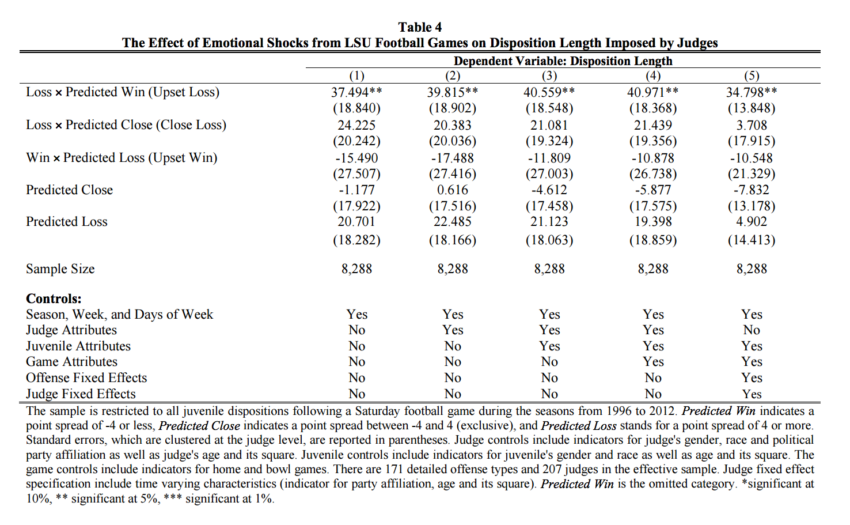Here’s the latest in a series of papers using football game wins and losses as a source of independent variation. Other work has showed the relationship of football to domestic abuse, rape, drinking, and, at UO, bad grades for undergraduate men. This time it’s about racial bias among Louisiana judges.
Former CAS Dean and Econ Prof Joe Stone tells me there are only two kinds of economic results: those that are obviously true, and those that are obviously false. I’d say this paper is one of the former, but that doesn’t make it less interesting. (Full disclosure: Naci and I are co-authors on crime). Any comments about where this fits into the “implicit bias” literature?
Emotional Judges and Unlucky Juveniles
Ozkan Eren and Naci Mocan NBER Working Paper No. 22611
September 2016 JEL No. D02,D03,J15,J71,K4,K41
ABSTRACT Employing the universe of juvenile court decisions in a U.S. state between 1996 and 2012, we analyze the effects of emotional shocks associated with unexpected outcomes of football games played by a prominent college team in the state. We investigate the behavior of judges, the conduct of whom should, by law, be free of personal biases and emotions. We find that unexpected losses increase disposition (sentence) lengths assigned by judges during the week following the game. Unexpected wins, or losses that were expected to be close contests ex-ante, have no impact. The effects of these emotional shocks are asymmetrically borne by black defendants. We present evidence that the results are not influenced by defendant or attorney behavior or by defendants’ economic background. Importantly, the results are driven by judges who have received their bachelor’s degrees from the university with which the football team is affiliated. Different falsification tests and a number of auxiliary analyses demonstrate the robustness of the findings. These results provide evidence for the impact of emotions in one domain on a behavior in a completely unrelated domain among a uniformly highly-educated group of individuals (judges), with decisions involving high stakes (sentence lengths). They also point to the existence of a subtle and previously-unnoticed capricious application of sentencing.

Be First to Comment